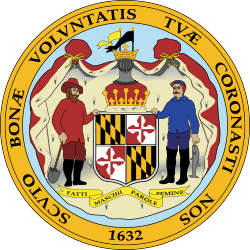This article includes a list of general references, but it lacks sufficient corresponding inline citations .(June 2011) |
January 7, 1969 | |||||||||||||||||||||||||||||||||||||
| |||||||||||||||||||||||||||||||||||||
| |||||||||||||||||||||||||||||||||||||
| Elections in Maryland |
|---|
 |
The 1969 Maryland gubernatorial special election was not a direct election, but a vote in the Maryland General Assembly to determine who would assume the governorship of Maryland after Spiro Agnew's resignation, following his election to the U.S. vice presidency.
Contents
At this time Maryland didn't have a position of lieutenant governor, and state law did not designate a person who would assume the office of governor in case of vacancy (unlike most states, when there is always a designated person such as lieutenant governor, Senate President or Secretary of State).
In case of vacancy, the General Assembly would choose a governor.
In 1969 the Assembly had a Democratic majority, so it was clear that Republican Agnew's successor would be a Democrat.
The election was held on January 7, 1969. State representative Marvin Mandel was elected governor. He took office that same day, upon Agnew's resignation.

